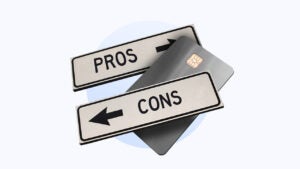4 perks of having business and personal cards from the same issuer




Key takeaways
- If you’re a business owner looking for a business credit card, there can be benefits to getting a credit card from the same issuer as your personal card.
- Building a positive, lasting relationship with a card issuer can lead to more credit opportunities. It also might be easier to manage multiple credit accounts in the same place.
- Credit card rewards can often be transferred from card to card within the same issuer. That way, you can make the most of the card with the highest redemption rate.
If you’re running a retail shop, freelancing or managing another type of small business, it’s important to keep business and personal expenses separate. However, having the same issuer for your personal and business credit cards can make this organization easier. Many credit card issuers offer various credit card types, giving you certain advantages to having your finances in one place.
1. Improves your chances of qualifying for a business card
Generally, banks prefer customers who hold several types of accounts with them, including savings accounts and checking accounts, car loans and home loans and a variety of credit cards. Having both a personal and business card with an issuer may help you qualify for higher credit lines, lower interest rates on other credit products and even free banking services.
The best business credit cards may require high credit scores, which can make it a challenge for a new business to be approved for a card. According to Markia Brown, Certified Financial Education Instructor behind The Money Plug, having a personal relationship with a lender can help your approval odds for new accounts.
If a consumer has established a mutually beneficial relationship with a bank or credit union, then they can leverage that personal relationship to apply for business credit accounts they usually would not have access to.— Markia Brown, Certified Financial Education Instructor behind The Money Plug
Say you’re interested in a business card with a limited-time welcome bonus but you have a limited credit history. By using the card responsibly over time, you can form a relationship with the issuer, build your business’s credit history and possibly move up to a card with excellent rewards quicker than if you looked for a card with another issuer.
2. Streamlines your account management
Credit card issuers have different customer service systems, phone numbers, websites and apps. If you’re busy — as most business owners are — you could save time by managing your accounts with just one issuer.
Lori Greymont, real estate investor and host of the reality series Funding Faceoff, is always on the go. That’s why she doesn’t juggle different banks. Both her personal and business cards are with Wells Fargo.
“With the one app on my phone, I can do everything,” says Greymont. “It saves me time, and that makes my life easier.”
Additionally, you can more easily compare money flow, transactions and other activity in your accounts when you only have one bank. This can be useful for new offers but also if you run into issues. By having your accounts with the same bank, your issuer has a fuller picture of what’s going on with your finances, making it easier for it to help you, whether its for disputes, card upgrades or wealth management.
“The consumer is already familiar with the bank and some of its policies, so they’ll be extremely comfortable doing business with that bank,” says Brown.
3. Allows for combining credit card rewards
Many of the best business credit cards offer points, miles or cash back rewards. You can try choosing a business card with a sign-up bonus and rewards that fit your most common spending categories.
If you have business and personal credit cards from the same issuer, it may be possible to combine your rewards. This could mean transferring your rewards balance to the card with the best redemption rate.
For example, if you have the Ink Business Preferred® Credit Card, you get a value of 1.25 cents per point when you redeem them for travel with Chase’s Ultimate Rewards program. But if you also have the Chase Sapphire Reserve® personal card, you get 1.5 cents per point on travel redemptions through Chase. So it makes sense to transfer points to the personal card.
This feature also comes in handy if you want to close one of your rewards cards with the same issuer. You can usually transfer your rewards balance to the card you keep.
4. Protects your credit score
When you apply for a credit card, a hard inquiry will temporarily and slightly lower your credit score. However, if your credit card issuer offers you the chance to open a business card after responsibly using a personal card (or the reverse), you may be able to avoid that hard inquiry. This can be helpful if you want to maintain or increase your credit score.
You can contact your credit card issuer directly and ask if it’ll approve a new credit account based on your personal relationship, bypassing a hard credit check. You can also wait for the issuer to contact you with an offer through the banking app or email.
The bottom line
Strengthening your relationship with a single card issuer might lead to more credit opportunities that you may not receive otherwise. You can view your credit statements and pay your bills in the same place, and you might be able to maximize rewards for both cards.
Keep in mind that it might also make sense to switch business credit card issuers to take advantage of perks like a sign-up bonus or better rewards. It just depends on your small business goals and which card is right for you.
Why we ask for feedback Your feedback helps us improve our content and services. It takes less than a minute to complete.
Your responses are anonymous and will only be used for improving our website.




